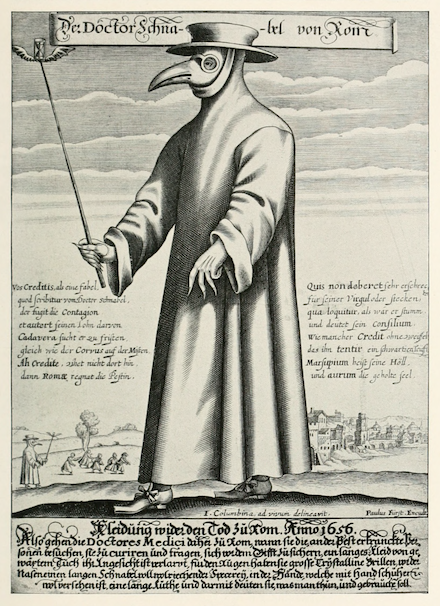
|
|
|
|
|
| Issue 16: | 1 Jan. 2023 |
| Poem: | 211 words |
By Rose Mary Boehm
Kleidung wider den Tod zu Rom, Anno 1656 *
The children observed him through holes in the wooden planks that separated the stables from the house. Shivered. Little Doreen peed her pants. Doctor Schnabel the plague doctor passed. They imagined they could feel the wooooosh on their faces from his long black cloak that billowed behind him as he strode. His terrifying mask matched his name. Once upon a time they would have laughed about anyone being called “Dr Beak.” In these dark times he made sure that he was feared and respected, and carried a long stick to keep at a distance those who would not keep it. He was counting the dead. 364 years later. We have ICUs, scanners, microscopes, sophisticated medicines and autopsies. We send rockets to the moon, have a space force. And still we do not know, have no certainties. We are counting the dead. How not to hug? How to make your child wear a mask, fear the invisible? How to have a friendly chat across an abyss of two meters? And yet, soon it’ll be business as usual. The economy must survive. The rich must get richer. Will we ever feel safe again?
* From medieval German: “Clothing against death in Rome
in the year 1656.”

Der Doctor Schnabel von Rom (1656)
Copper engraving published by Paulus Fürst
MacQueen’s Notes:
1. Image above was downloaded from the public domain on 26 December 2022 via Wikimedia:
https://commons.wikimedia.org/wiki/File:Paul_F%C3%BCrst,_Der_Doctor_Schnabel_von_Rom_(Holl%C3%A4nder_version).png
2. Paulus Fürst (1608–1666) was a German publisher, printer, and book dealer in Nuremberg who produced a range of printed works, from books and copper engravings to flyers and broadsides. His bookstore remained in business for more than 30 years after his death. (Source: Wikipedia.)
Fürst’s now-iconic copper engraving of Doctor Schnabel was a satirical broadside on doctors in Rome and their protective clothing against the plague. It includes a 16-line poem written in macaronic verse, which jumbles different languages, in this case Latin and German, for satiric or comedic effect.
For a discussion of the engraving, including a translation of the poem, see this essay (pages 54-57 and footnote 6 on pages 66-67):
“Doctor Beaky, the Four Thieves, and De Fabulous Pestis” by Greg Kelley in Contemporary Legend (Series 3, Volume 10, December 2020), Special Issue on COVID-19.
3. In 1656, after hundreds of thousands of people died from the plague in Europe, “the German engraver Gerhart Altzenbach published a popular image of a plague doctor in full garb, with text describing how the outfit protected the wearer against death. ...Copied from Altzenbach’s illustration, [Fürst’s version] alternately describes how the doctor does nothing but terrify people and take money from the dead and dying.
“Fürst also added some extra elements to the plague doctor outfit which appear in versions to this day, such as the claw-like gloves and the pointing stick topped by a bat-winged hourglass. These elements are satirical and not a historical reality, but they have nonetheless shaped much of how the stereotypical plague doctor is pictured today.”
[Source of quoted text: “Plague doctors: Separating medical myths from facts” by Winston Black in LiveScience (updated 26 November 2020); link retrieved on 26 December 2022: https://www.livescience.com/plague-doctors.html ]
Rose Mary Boehm
is a German-born British national living and writing in Lima, Peru. Her poetry has been published widely in mostly US poetry reviews (online and print), and has been twice nominated for a Pushcart Prize. She is the author of two novels as well as six poetry collections. Her most recent, Do Oceans Have Underwater Borders? (Kelsay Books, 2022), Whistling in the Dark (Taj Mahal Publishing House, 2022), and Saudade (Kelsay Books, 2022), are available on Amazon.
Author’s website: https://www.rose-mary-boehm-poet.com/
| Copyright © 2019-2025 by MacQueen’s Quinterly and by those whose works appear here. | |
| Logo and website designed and built by Clare MacQueen; copyrighted © 2019-2025. | |
|
Data collection, storage, assimilation, or interpretation of this publication, in whole or in part, for the purpose of AI training are expressly forbidden, no exceptions. |
At MacQ, we take your privacy seriously. We do not collect, sell, rent, or exchange your name and email address, or any other information about you, to third parties for marketing purposes. When you contact us, we will use your name and email address only in order to respond to your questions, comments, etc.